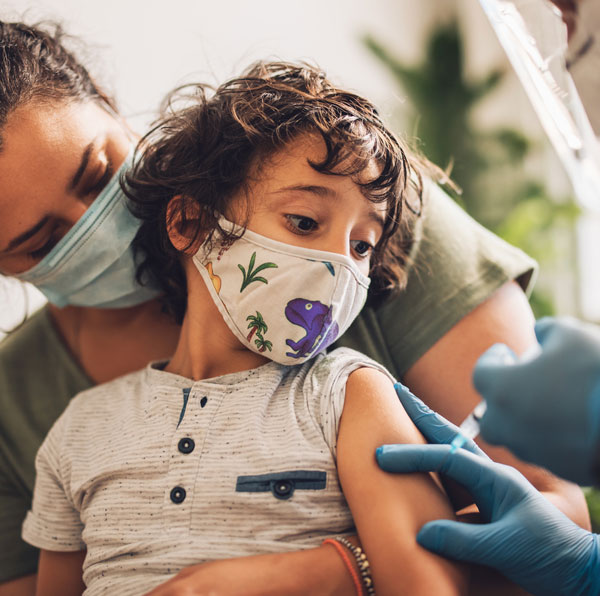
Marketa Rejtar
DNP, APRN, CPNP-AC/PC
Director, Pediatrics NP Program Program; Associate Clinical Professor Nursing
You are Bouvé

The goal of the Pediatric Nurse Practitioner (PNP) programs is to prepare Pediatric Nurse Practitioners who provide evidence-based, comprehensive, family-centered healthcare to infants, children, adolescents, and their families. The program provides a broad background of advanced pathophysiology, advanced general and pediatric pharmacology, and advanced health assessment.


In addition, theoretical basis of best practice and diagnostic clinical reasoning skills are taught and developed as students learn the advanced practice provider management and technology skills needed to care for children across the continuum of care.
The highly immersive hands-on clinical core curriculum is intended to provide PNP students with real-life and/or simulated advanced patient care experiences.
Northeastern’s PNP program is the only graduate nursing program in New England to prepare Acute-Care Pediatric NPs.
Upon completion of the Pediatric Nurse Practitioner program, graduates are eligible to sit for all national certification exams in their area of practice.
The program in which you are enrolled prepares you to practice in any state, based on the information posted on each state’s nursing licensure website.
Degree types:
– MS in Pediatric Primary Care
– MS in Pediatric Acute and Primary Care
– CAGS in Pediatric Acute Care
– CAGS in Pediatric Primary Care
– CAGS in Pediatric Acute and Primary Care
– Post-Master’s Pediatric Acute Care Cert
Study options:
– On ground (Boston Campus)
– Full-time or part-time
Application deadline: Fall – August 1
GRE: Not required
F1 Visa: Not eligible
For students who hold a Bachelor of Science degree in nursing (BSN), two concentrations are available:
The Primary Care (PC) concentration prepares students for the role of pediatric nurse practitioner (PNP) focusing on well-child care and prevention, and management of common acute and chronic illnesses. Students may study either full-time or part-time. Prepares students to sit for the Pediatric Primary Care PNP certification exam
The Dual Primary/Acute Care concentration prepares pediatric nurse practitioner (PNP) students for both primary and acute care roles. Pediatric Acute Care (AC) nurse practitioners are prepared to care for patients with acute, complex acute and chronic, and critical illnesses in a variety of settings. Prepares students to sit for both the Pediatric Primary Care PNP and the Acute Care PNP certification exams. Students may study either full-time or part-time.
For students who hold a bachelor’s degree, but not a BSN.
The Direct-Entry MS in Nursing (MSN) prepares students for the role of nurse practitioner (NP) focusing on the prevention of disease, maintenance of health, and management of common acute and chronic illnesses in an age-specific population. The student will declare their population specialty at the conclusion of their BSN and the specialty track directors will be notified. Students will complete their requisite RN clinical experience and return to the program after 1-2 years depending on the specialty track.
For students who hold an MS degree in Nursing (MSN). Three certificates are available for Pediatric Nurse Practitioner (PNP) study:
The Primary Care Certificate prepares graduates to sit for the Pediatric Primary Care PNP certification exam.
The Acute Care Certificate prepares graduates to sit for the Pediatric Acute Care PNP certification exam.
The Dual Primary/Acute Care Certifcate prepares graduates to sit for both the Pediatric Primary Care PNP and the Acute Care PNP certification exams.
For students who:
Prepares graduates to sit for the Pediatric Acute Care PNP certification exam.
24+ credits depending on PNP concentration:
For students who hold an MS degree in Nursing (MSN) or Doctor of Nursing Practice (DNP) and are already Pediatric or Family Nurse Practitioners (FNPs) certified in primary care.
Prepares graduates to sit for the Pediatric Acute Care PNP certification exam.

DNP, APRN, CPNP-AC/PC
Director, Pediatrics NP Program Program; Associate Clinical Professor Nursing
The curriculum is subject to change. Please see Northeastern’s academic catalog.
Please note that all letters of recommendations and official transcripts must be submitted via NursingCAS.



Clinical immersion in advanced nursing practice is a major focus of this program. Our long history of partnering with local and regional hospitals and clinical sites serving diverse and underserved community ensures access to clinical and research opportunities with at-risk pediatric populations. Our many hospital and community affiliations have included:
Students also have clinical experiences in neighborhood health centers, health maintenance organizations, child-care centers, school-based clinical, homeless shelters, and private practices. Working with expert clinicians and supervised by our faculty, students develop the expertise necessary for patient management and advanced nursing practice skills across the care continuum for children and adolescents.
A minimum of one year full-time exclusive pediatric RN experience is required to apply and two years of full-time exclusive pediatric RN experience is required prior to the start of clinical. The primary care/acute care dual program of study requires in-patient exclusive pediatric RN experience and Pediatric Advanced Life Support (PALS) certification prior to the start of the acute care clinical.
Students may transfer 9 semester hours from other master’s level courses from a different institution if not credited to a previous degree. Courses must be approved by the program director.
Yes, for the Traditional MS Entry PNP Program. However, during the final year of the program, students must complete a number of direct patient care hours per week of clinical along with course work.
Both the primary care and primary care/acute care dual program are delivered in the traditional, on-ground format.
Students in the dual acute/primary care PNP concentration complete the primary care curriculum (41 semester hours) with additional course work (11 semester hours) emphasizing complex acute care and critical care of infants and children.
Students in the dual acute/primary care concentration complete 750 direct clinical hours in complex acute/chronic and/or critical care experiences in addition to the minimum 750 direct clinical hours completed during the primary care portion. Students in the dual acute/primary care PNP concentration complete a minimum of 800 direct clinical hours.